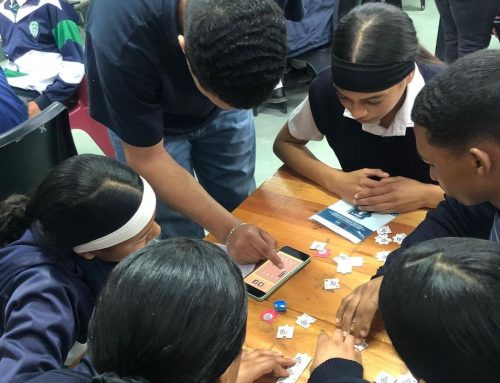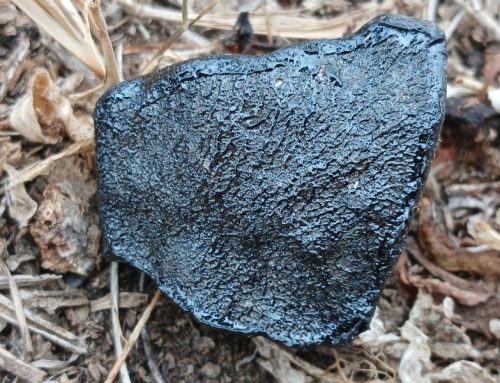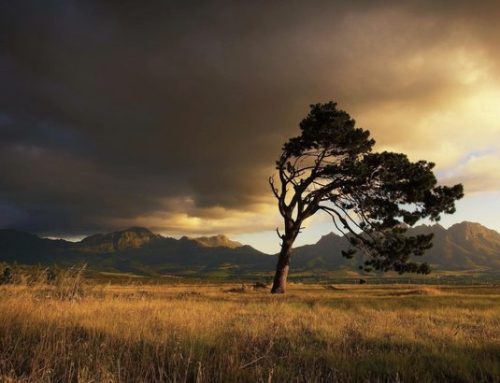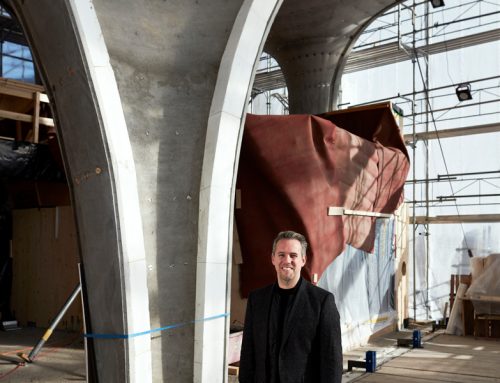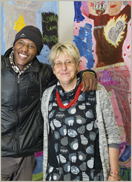
They’re young, they’re unskilled, they don’t have jobs, most are not well educated and they are sitting at home not knowing what to do. Lisa Garson has a plan.
Lisa Garson graduated from Wits with her BSc in 1989 and BSc Hons in 1990.
There are millions of very frightened young South Africans who are facing bleak futures and losing hope fast. These are not the promising achievers that universities, colleges, industry and youth advancement programmes are looking for. Quite the opposite; they don’t have good track records or academic profiles or anything with which to sell themselves. And they don’t know where to turn.
That’s where Lisa Garson comes in. For most of her life, she has been driven to make a difference to the lives of young South Africans who come from difficult and impoverished backgrounds.
Two years ago she established an NGO called Action Volunteers Africa (AVA) in Cape Town to place young people from townships around Cape Town who are not in employment education or training – known as Neets – in NGOs as volunteers and interns to gain skills and much-needed work experience.
More than 3.7million Neets
“In the 18-25 age group South Africa has more than 3.7million Neets. They have been churned out through one of the worst education systems in the world and then little is done to help them progress after leaving school. The result is a rapidly growing group of young people whom everyone forgets. I looked at this group and thought that something needs to be done about this,” says Cape Town-based Garson who is the founder and director of a successful placement agency for NGOs in South Africa and Africa. Established 20 years ago, it is called Action Appointments Development Recruitment.
“Knowing the NGO environment as I do, I decided to approach several Cape Town-based NGOs – such as the Red Cross Children Hospital, the SPCA and Afrika Tikkun – to partner with the AVA model,” says Garson who set up an AVA office in Claremont.
The NGOs receive R750 per month per recruit, and, in turn they help the recruit to learn skills and to be mentored through the organisation. The NGOs also benefit from an extra person helping them, and all NGOs need this.”
Computer skills, personal branding skills
All recruits are screened and interviewed by Garson and participate in the AVA orientation programme before starting work. Aspects covered include a basic introduction to computers and using the Internet, interview skills and an introduction to NGOs.
Recruits also attend a monthly motivation forum where they acquire a range of navigational skills, including career guidance, how to look for opportunities, personal branding, producing a CV, networking and communication and how to deal with stress. Each recruit also gets a small monthly stipend. “Poverty levels are dire in their homes and many of them use the stipend to put food on the table,” says Garson.
Body maps and vision boards
As part of the programme the recruits create body maps and vision boards. “We work with an art facilitator and the recruits create artworks about themselves, which express how they see themselves, how others see them and what they hope for in their future based on realistic career goals,” Garson explains.
They take the vision boards home and put them up on a wall where they can look at them on a regular basis, which really helps them to start internalising how they want to see themselves and what they want to achieve.
100 AVA recruits in two years
“The aim is for recruits to be employed for up to one year with the host NGOs,” says Garson who, over the past two years, has placed over 90 AVA recruits.
What she is doing is as rewarding as it is heartbreaking.
“These young people have never been given a chance in life. Many come from very dysfunctional backgrounds where drug abuse, joblessness and violence is endemic,” she explains. Facing murder, rape, robbery, pregnancy, unplanned children and lack of parental support is part of their everyday.
“Many have no emotional coping skills and when something goes wrong at home, such as a death in the family, or a parent that tells them to stay at home, that is what they do. We teach them that being employed and being reliable is hard work, and that it takes stamina and dedication to turn up at work no matter what is happening in their lives.”
Their body language changes
Given a bit of a start in life, many of the recruits start transforming – they become stronger and more confident, their body language changes and they are able to find solutions. Several are now employed.
One of them is one of the 2013 recruits, 20-year-old Siphumelele Zibi from the Eastern Cape who lives in Khayletisha. His mother moved the family here so that she could look for work after his father abandoned the family. Zibi was in Grade 10 at the time.
His dream is to work in conservation but he didn’t have a science or maths teacher for the last two years of school, which meant he didn’t achieve the marks required to study in that field.
“We didn’t have a conservation NGO placement opportunity so we decided to place him with the SPCA in Grassy Park because he is passionate about animals,” says Garson.
Used his networking skills
Traveling to Grassy Park each day and working long hours, often doing extremely menial work, was not easy but he showed great commitment and great care for the animals. After eight months he used the networking skills he developed on the programme to secure a job at the Tygerberg Animal Hospital.
The HR manager at the Tygerberg Animal Hospital contacted AVA and the SPCA for a reference, and they could both vouch for him. He is now a permanent staff member there; he supports his mother and sister, and still plans to study conservation one day.
Another successful placement is 18-year-old Muneeba Maart from Retreat who had just had a baby when she joined the AVA programme at the beginning of 2013.
“It’s far from ideal to take on recruits with babies because it makes organising their lives far more difficult, but the reality is that many of these young people already have children,” says Garson.
Muneeba was really battling with life when she was placed as a teacher’s assistant at Capricorn Primary in an informal settlement near Muizenberg called Vrygrond. She proved to be very good with children and has since been offered a fulltime job and the opportunity to study through Unisa to become a teacher.
Long, hard, close-up look at our youth
“Over the past two years, I have met and come to know many young people like Siphumelele and Muneeba, and I have had the opportunity to take a long, hard, close-up look at the state of our youth. I have learnt a lot,” says Garson.
“I have learnt that even though young people in our country are rebellious, fun loving, materialistic and narcissistic, they are also willing, tenacious, determined and courageous. Basically, they’re like most young people across the world, facing the chasm between school and the adult world of work.
Our youth are very frightened
“The difference is that our youth are also very frightened because they have no prospects. When I interview them to become recruits, they don’t come up with fancy reasons why they want to be chosen; most say it’s because they don’t want to sit at home doing nothing.”
Garson funded AVA from her recruitment business for the first six months and has since been fund-raising. “I don’t like fund-raising but there is no alternative if we are to grow the programme,” says Garson who has since received various amounts of funding from a range of organisations, including Discovery, the DG Murray Trust and the Christian Development Trust.
Funders recognise it as an excellent model that is extremely cost effective and it works.
AVA is currently only in Cape Town. Her next challenge is to expand it out of the province and to have AVA offices all over South Africa, and she is already working on this. As Garson puts it: “That’s my big dream.”
For more information go to www.avafrica.org.za
My childhood sights, sounds and smells are from Wits
Lisa Garson and her three sisters, Catherine, Fiona and Philippa, grew up on Wits campus.
Their father, Noel Garson, was an academic at Wits for almost 40 years, from 1957 – 1996. During this time he was the Head of the History Department and Dean of Arts. He also served for ten years on the University Council as a member elected by Senate.
Their mother, Yvonne Garson, was a librarian at the William Cullen for many years, and developed a special interest in antique maps of Africa.
Both are now 82 years of age, healthy and active, and pursuing their interests.
“My childhood sights, sounds and smells are from Wits,” says Lisa. “I can still vividly remember the smell of the corridors of Central Block where my Dad had his office in the left hand corner on the ground floor.
“I remember skidding down the beautifully polished floors and being fascinated by the koi fish in the huge pond outside his office window. Sadly, it has long since been covered over with ivy.
“I even learnt to swim at Wits, with the terrifying Mr Macfarlane. Lessons with him were like hell and I can still hear his harsh reprimands when we did something wrong. He would also film us swimming to show us where we were going wrong, which was pretty advanced for the 1960s. Thanks to him I can swim very well.”
The Garson family lived in Parkview – where Noel and Yvonne still live, but in a different home.
From a young age, all four daughters were highly conscientised about apartheid. “Through our parents we knew exactly what was happening in South Africa,” says Lisa who is the oldest of the four ‘Garson girls’ as they are known; all of whom studied at Wits, as did three of their husbands.
A thoroughly Wits family
Catherine graduated with an Hdip Ed and a BA Hons in translation studies (French and Spanish) from Wits. Today she is a freelance editor specialising in policy and economic research on developing countries, particularly sub-Saharan Africa. She works for government organisations and independent think tanks in South Africa and the United Kingdom, and is also writing a novel.
Fiona graduated as an architect from Wits where she returned as a teacher, developing a foundation programme aimed at assisting students from disadvantaged backgrounds to cope with a mainstream architectural degree. She ran this programme for 10 years.
Fiona and her business partner Nina Cohen won the competition to design the Wits Art Museum (WAM) and continue to work on a number of Wits architectural projects. Fiona is married to Dr Robbie Potenza. He studied Medicine at Wits and is a GP in private practice at the Wits Donald Gordon Medical Centre.
Philippa graduated with a BA Honours in Politics from Wits and is a successful freelance journalist who worked for many years on the Mail & Guardian. She married psychiatrist Dr Charles Perkel who studied medicine at Wits. They live in New York.
Lisa married Dugan Fraser who has a Masters in the Sociology of Development from Wits and is now the programme director at the RAITH Foundation, a South African philanthropic foundation that supports social justice initiatives. They divorced amicably in 2000.
First year in 1976
Lisa’s first year at Wits was 1976, year of the Soweto student uprisings.
The deaths were so shocking for her that she battled to focus on her studies. “Everything was in chaos and campus was ablaze,” she recalls. “I felt very depressed about South Africa. I thought Madiba would spend his whole life in jail and that nothing would ever change.”
She abandoned university and moved to Australia for seven years where she lived in Sydney and became a tax assessor – was very good at it and loved it. But she could not get South Africa out of her system and returned home.
Obsessed with South Africa
“I felt that I could not be out of my country any longer, I was obsessed with South Africa all the while I was in Australia. South Africa is not an easy country to leave.”
On her return, she enrolled for her BSc, moved into a commune in Yeoville and ran an educational programme called the German Academic Exchange Enrichment Programme (GAEEP). “It was a part-time job where a group of us from Wits tutored 150 Grade 11 and 12 learners from Pretoria’s townships on Saturdays. My sister Fiona was one of the tutors – she taught Biology and she was a very good teacher,” Lisa recalls.
Battered green VW Beetle
Her battered green VW Beetle, packed with a hot water urn, 150 cups and a huge TV was a familiar sight in Yeoville. “The TV was used to show the learners struggle movies after lessons like The Battle for Algiers. We were very obsessed with being relevant,” she smiles.
After graduating with her BSc Honours in 1990, she joined the Science Education Project, an excellent, national supplementary education system that is regrettably no more. “I was the Human Resources Manager and we grew the project from 30 staff to 100 in one year.”
Two adopted and two biological
At the same time she married Dugan Fraser. They adopted two children and had a further two biological children.
“Our adopted children were the grandchildren of the woman who worked for my parents for 25 years, Deborah Malebe. She had raised her granddaughter Maphiri and grandson Lefiri and we adopted them after she died. They were seven and nine at the time,” Lisa continues.
Maphiri is now 31 and works in Human Resources at Wits where she is also studying for her BA. Lefiri studied sound engineering and lives near Lisa in Fish Hoek. The other two children, Callum (19) and Oona Jane (16) live with Lisa. Oona Jane is at school and Callum is doing a BA at the University of Cape Town,” says Lisa.
So much more of an activist in my later life
“I moved to Cape Town from Joburg seven years ago because I found it nerve-wracking raising two teenagers in Joburg. I am very connected to the natural environment and I wanted them to experience this. I felt Cape Town offered a better lifestyle for them.
“While we have certainly experienced this, at the same time I have to add that Cape Town is still very much a city divided, with an extreme geographical divide between the have’s and have not’s. This is what has made me become so much more of an activist in my later life!”
